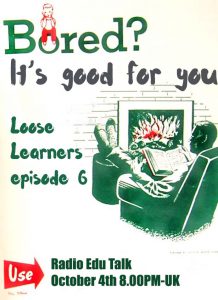Loose Learners ep 6 The StillWeb
Mariana Funes telling John Johnston about The Still Web – A Digital Contemplation Studio.
After trying twice to do our episode 6, we were third time lucky this Wednesday October 4th. Technical gremlins went elsewhere and we got on with the business at hand: contemplative activism online.
We speak to the need for balance between activity and stillness in learning and thinking. We decided to do this episode on the StillWeb.org after discussing online habits. skilful and otherwise. in the last episode. We wanted to explore the relevance of a lack of awareness of our online habits when we are thinking about technology in education.
This episode explores the need for contemplation and pause to enable intentional choices when using technology. The still web was setup to support digital contemplation and we focus on that project in this episode. This is a rather different approach to online and digital life, but will be of interest to educators and others who are concerned with how digital tools affect us and our wellbeing. We need cycles of activity and respite, both online and offline. What Mara Adelman refers to as a ‘pulse for everyday life’. Online life does not encourage much respite and the implications of this to the use of technology in education are significant.
We talk about a particular element of the Still Web, the Daily Stillness which offers daily activities to help you create pauses in your day with interesting resources and activities for contemplative reflection. The Still Web offers a lovely contemplation space created by John Johnston and we hope to develop further interactive spaces like it for respite from online life. The site has been developed by Alan Levine with contributions from John Johnston and also Viv Rolfe and David Kernohan who helped us develop the video that introduces the Still Web idea.
There are many resources for respite online, we try to curate this regularly via the Daily Stillness. On Twitter you may want to follow: Alexa Clay who is working on developing calm technology, Tristan Harris who wonders what our apps would be like if we had ‘time well spent’ as a design principle and Sue Thomas who works with Digital Wellbeing through bringing nature to the online world. Also Paul-Olivier Dehaye is doing excellent work to bring large tech companies to account on the way they (mis)use our data.
Enjoy this episode and do tweet us links for any new themes you would like us to discuss in future episodes.


